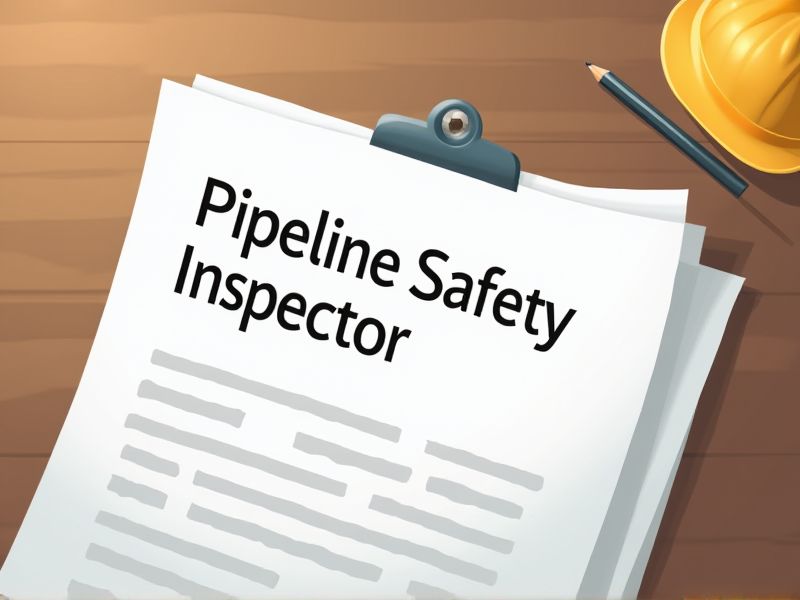
Pipeline safety inspectors operate in a high-stakes environment where their expertise directly impacts public safety and environmental protection. Gaining specific certifications equips inspectors with a validated understanding of industry standards and regulatory requirements. These credentials ensure inspectors can identify potential hazards, conduct thorough evaluations, and implement preventive measures effectively. Key certifications required for a Pipeline Safety Inspector include those listed below.
PHMSA Pipeline Safety Inspector Certification
Pipeline Safety Inspector Certification from PHMSA is needed because it ensures that inspectors have the necessary knowledge to identify potential hazards. Certification helps maintain consistency and reliability in safety assessments across various pipelines. Uncertified inspectors may overlook critical issues, leading to environmental and safety risks. Certification also enhances public confidence in the safety measures governing pipeline infrastructures.
API 1169 Pipeline Construction Inspector Certification
API 1169 Pipeline Construction Inspector Certification ensures inspectors possess the necessary knowledge and skills to evaluate pipeline construction effectively. By certifying inspectors, the program helps to standardize inspection practices, reducing the risk of construction errors and safety incidents. Properly certified inspectors are more adept at identifying potential hazards, thereby enhancing overall pipeline safety. Many regulatory bodies and industry stakeholders now recognize and require this certification to maintain consistent quality and safety standards across pipeline projects.
API 570 Piping Inspector Certification
Having an API 570 Piping Inspector Certification ensures that inspectors possess a thorough understanding of inspection codes and standards crucial for evaluating pipeline integrity. With this certification, inspectors are equipped to identify potential risks and defects, thereby reducing the likelihood of pipeline failures. Through this knowledge, inspectors can implement effective maintenance strategies, enhancing overall safety and reliability. This certification also signifies a professional level of competence, promoting industry confidence in the inspector's ability to manage compliance with safety regulations.
NACE Coating Inspector Certification
The NACE Coating Inspector Certification provides critical knowledge on corrosion prevention, an essential aspect to maintaining pipeline integrity. Trained inspectors can identify potential coating failures, preventing leaks and structural weaknesses. Certification ensures standardized inspection practices, reducing the risk of human error in assessment. Recognized industry-wide, the credential enhances trust in safety audits and compliance with regulatory standards.
NACE Cathodic Protection Technician Certification
NACE Cathodic Protection Technician Certification ensures that a Pipeline Safety Inspector possesses the necessary technical skills to assess corrosion control practices effectively. Corrosion can compromise the integrity of pipelines, leading to leaks and environmental hazards, making expertise in cathodic protection crucial. Certification verifies that inspectors are up-to-date with industry standards and techniques for maintaining pipeline safety. By having certified technicians, companies can mitigate risks associated with pipeline failures, thus promoting environmental and public safety.
OSHA 30-Hour Construction Safety Certification
OSHA 30-Hour Construction Safety Certification equips pipeline safety inspectors with in-depth knowledge of workplace safety regulations, which helps prevent accidents on-site. Training enhances their ability to identify potential hazards around pipeline construction and maintenance activities, reducing the risk of incidents. Inspectors with this certification contribute to compliance with federal safety standards, ensuring projects adhere to legal requirements. The certification also fosters a culture of safety, which can lead to higher efficiency and lower costs associated with workplace injuries.
API Non-Destructive Testing Certification
The API Non-Destructive Testing (NDT) Certification is needed for Pipeline Safety Inspectors because it equips them with the skills to identify potential flaws in pipeline systems without causing damage. This ability to detect defects early helps prevent catastrophic failures, thereby ensuring continuous and safe operation. With the rise in aging pipeline infrastructure, there's an increased demand for certified inspectors who can conduct thorough and reliable evaluations. Employers often prefer or require certification to meet regulatory standards and promote trust in their safety practices.
ASNT Level II Non-Destructive Testing Certification
ASNT Level II Non-Destructive Testing Certification equips inspectors with the technical expertise necessary to identify potential defects in pipelines. The certification ensures that inspectors possess standardized skills to effectively apply NDT methods, such as ultrasonic testing and radiography. This proficiency reduces the risk of undetected pipeline failures, enhancing overall safety and reliability. Regulatory compliance often mandates such certifications, thereby reinforcing the trustworthiness of safety inspections.
NFPA Fire Protection Certification
NFPA Fire Protection Certification is essential for a Pipeline Safety Inspector because it provides a standardized understanding of fire safety protocols critical for handling hazardous materials. This certification ensures inspectors possess the knowledge to evaluate fire risks and implement proper safety measures in pipeline infrastructure. Fire-related incidents pose significant risks to pipeline integrity and surrounding environments, necessitating expertise in prevention and response. Certification through NFPA also demonstrates a recognized level of competency, enhancing trust and compliance within the industry.
Certified Hazardous Materials Manager (CHMM) Certification
Pipeline safety inspections require a comprehensive understanding of hazardous materials, which the CHMM certification provides. Knowledge from the certification enhances the ability to assess and mitigate risks associated with the transportation of hazardous substances through pipelines. Holding a CHMM certification ensures inspectors are up to date with regulatory compliance and safety protocols. Employers often prefer or require certification to confirm a candidate's expertise in managing environmental and safety challenges related to hazardous materials.
Summary
When you as a Pipeline Safety Inspector acquire specific certifications, your knowledge and expertise in industry standards and regulations are significantly enhanced. This expertise increases your ability to identify potential safety hazards and implement effective preventive measures. Employers are more likely to trust and value your insights, leading to career advancements and increased responsibilities. Certification can also boost your credibility, making you a more authoritative figure in your field.
